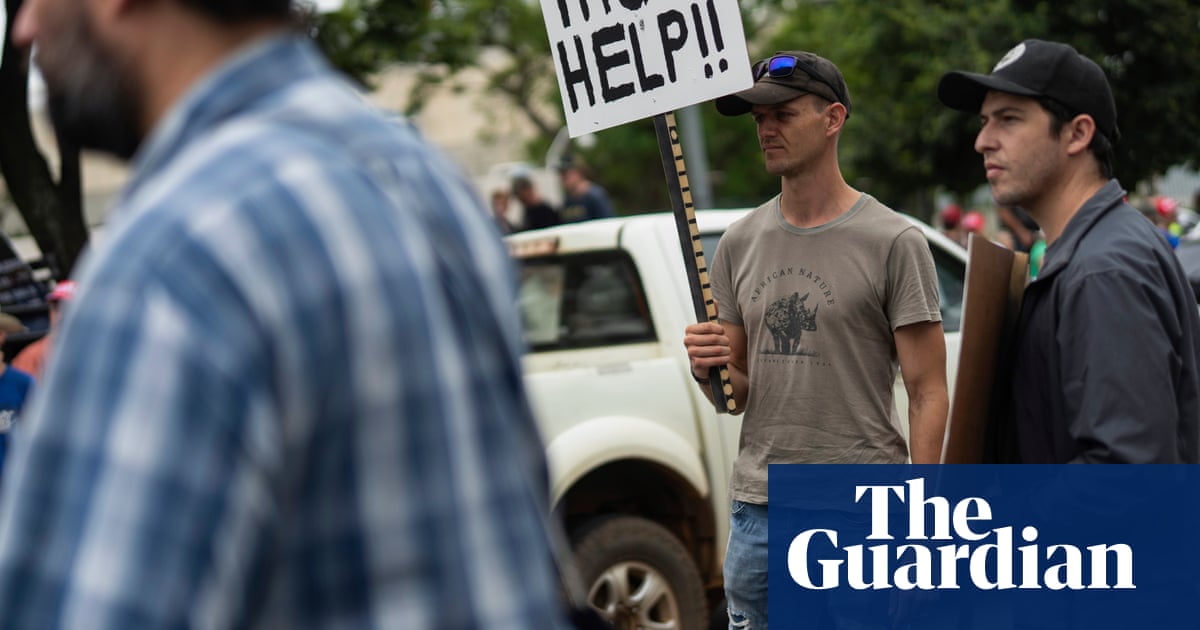The Episcopal church’s migration service is refusing a directive from the federal government to help resettle white South Africans granted refugee status, citing the church’s longstanding “commitment to racial justice and reconciliation”.
Presiding bishop Sean Rowe announced the step on Monday, shortly before 59 South Africansarrived at Dulles international airportoutside Washington DC on a private charter plane and were greeted by a government delegation.
Episcopal Migration Ministries instead will halt its decades-long partnership with the government, Rowe said.
Donald Trump opened a fast-tracked refugee status to white South Africans, accusing their government of discrimination, even as his administration abruptly shut down the overall US refugee program. The South Africans jumped ahead of thousands of would-be refugees overseas who had been undergoing years of vetting and processing.
Episcopal Migration Ministries has long resettled refugees under federal grants. Rowe said that about two weeks ago, the government contacted it and said it expected the ministry to resettle some of the South Africans under terms of its grant.
“In light of our church’s steadfast commitment to racial justice and reconciliation and our historic ties with the Anglican Church of Southern Africa, we are not able to take this step,” Rowe said. “Accordingly, we have determined that, by the end of the federal fiscal year, we will conclude our refugee resettlement grant agreements with the US federal government.”
South Africa’s government has vehemently denied allegations of discriminatory treatment of its white minority residents.
“It has been painful to watch one group of refugees, selected in a highly unusual manner, receive preferential treatment over many others who have been waiting in refugee camps or dangerous conditions for years,” Rowe said. “I am saddened and ashamed that many of the refugees who are being denied entrance to the United States are brave people who worked alongside our military in Iraq and Afghanistan and now face danger at home because of their service to our country.”
He also said many refugees, including Christians, are victims of religious persecution and are now denied entry.
He said the church would find other ways to serve immigrants, such as those already in this country and those stranded overseas.
The move marks the end of a ministry-government partnership that, for nearly four decades, has served nearly 110,000 refugees from countries, including Ukraine, Myanmar and Congo, Rowe said.
It’s not the first high-profile friction between the Episcopal church and theTrump administration. Bishop Mariann Budde of Washington DC drew Trump’s anger in January at an inaugural prayer service in which she urged “mercy” on those fearing his actions, including migrants and LGBTQ+ children.
The Anglican church of Southern Africa includes churches in South Africa and neighboring countries. It was a potent force in the campaign against apartheid in the 1980s and 1990s, an effort for which the late archbishop Desmond Tutu received the Nobel peace prize in 1984.
Another faith-based refugee agency, Church World Service, says it is open to serving the South African arrivals.
“We are concerned that the U.S. Government has chosen to fast-track the admission of Afrikaners, while actively fighting court orders to provide life-saving resettlement to other refugee populations who are in desperate need of resettlement,” Rick Santos, CWS president and CEO, said in a statement.
He added that the action proves the government knows how to screen and process refugees quickly.
“Despite the Administration’s actions, CWS remains committed to serving all eligible refugee populations seeking safety in the United States, including Afrikaners who are eligible for services,” he said. “Our faith compels us to serve each person in our care with dignity and compassion.”
The Episcopal ministry and CWS are among 10 national groups, most of them faith-based, that have partnered with the government for refugee resettlement.
